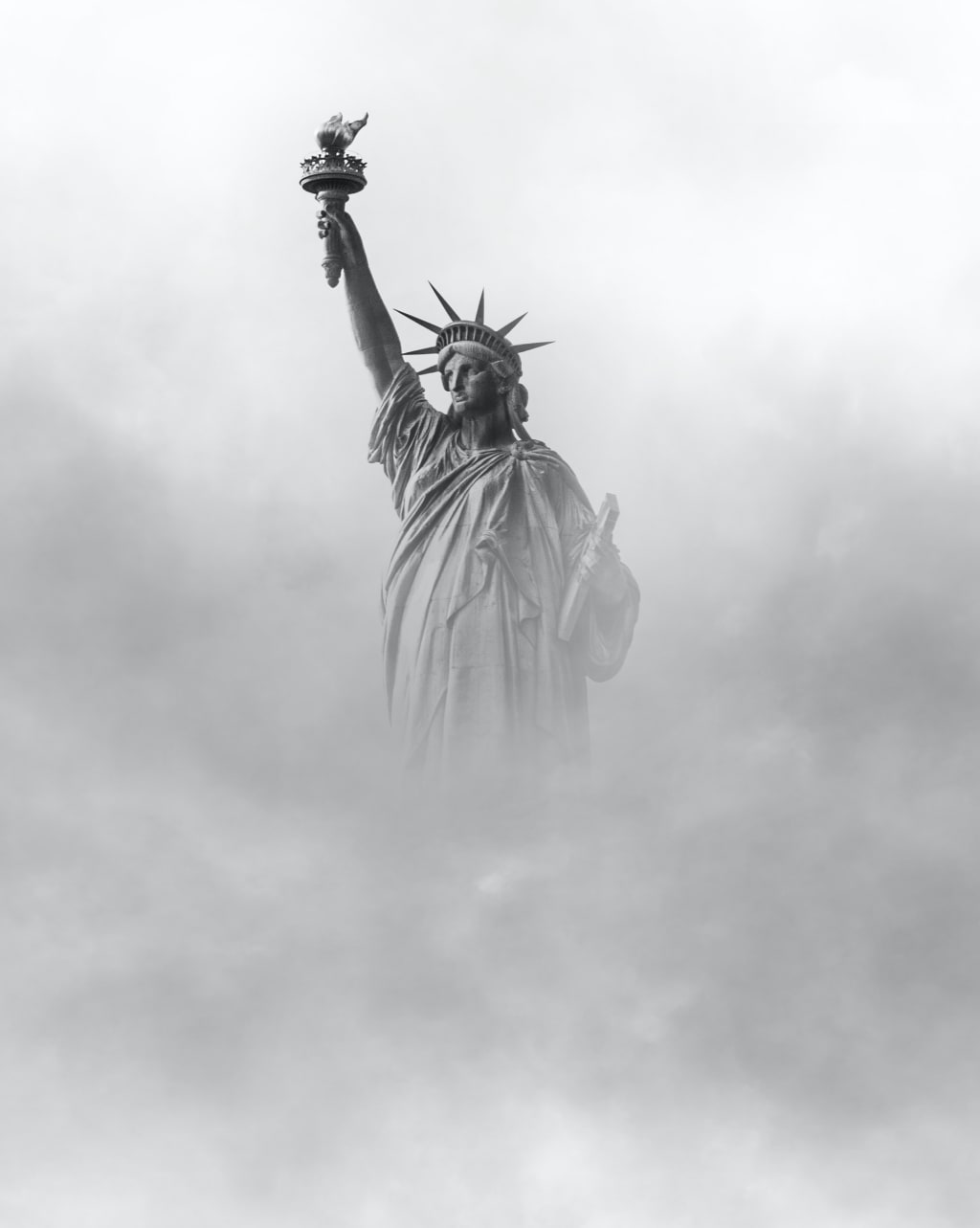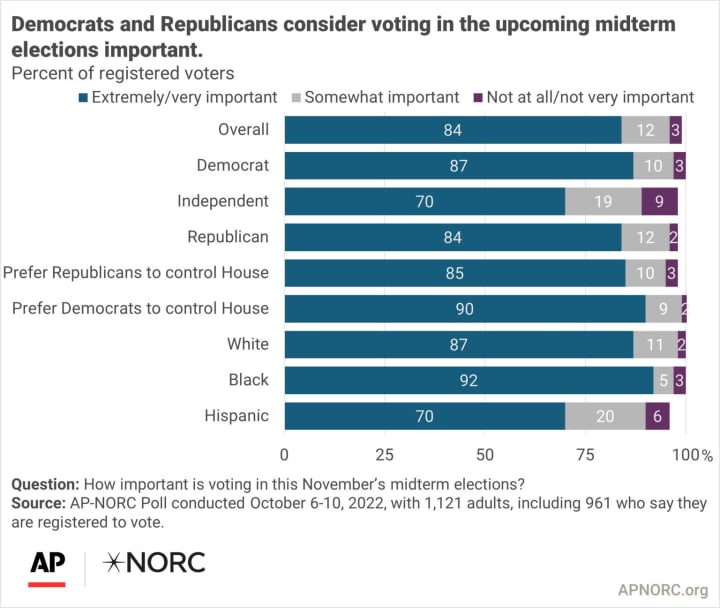This Election May Be Clouded by Conflict
Election denial, voter intimidation part of challenge

The Nov. 8 election could become a chaotic mess in swing states because of growing hostilities, fears, conspiracies, and anti-democratic strategies.
Just a third of Americans think the election will be “free and fair,” with 39 percent are unsure and 28 percent certain it won’t be fair, according to a recent FiveThirtyEight analysis.
Four out of five in that survey say they are either “very” or “somewhat” worried about the future of our democracy—with nearly identical levels of worry among the two political parties and independents. Of course, Democrats and Republicans see each other as the real threat.
Despite Donald Trump’s persistent lie that the 2000 presidential election was stolen and the slew of voter restrictions passed in response, both Republicans and Democrats are enthusiastic about voting. For example, Georgia voters broke records on the first days of early voting.
Recent developments and opinion surveys indicate various challenges loom before the final votes are announced and accepted:
Election denialism
A majority of Republican nominees on the ballot for the House, Senate and key statewide offices — 291 in all — have denied or questioned the outcome of the last presidential election, according to a Washington Post analysis. At least 171 are running in safe GOP states, and are likely to win.
Some, like Arizona’ s Mark Finchem — a Jan. 6 insurrectionist and Oath Keeper supporter — may end up overseeing future elections, although he says he would not have certified President Biden’s win there.
Yet being an election denier is not a drawback, according to the New York Times/Sienna poll of likely voters: 71 percent of Republicans and 37 percent of independents say they would be comfortable voting for one. Only 12 percent of Democrats agreed.
There are plenty of election deniers already in office, and they have worked hard to passed laws allowing them more say over how elections are run and certified. It’s a safe bet that some state would exercise that power.
Refusal to concede
Thirty-nine percent of Republicans will blame election fraud if the GOP doesn’t win control of Congress, while 26 percent of Democrats will say the same if their party doesn’t win, according to a new Axios-Ipsos poll.
Less than half of Americans, 46 percent, believe candidates “should commit in advance to accepting the results,” says a Yahoo News/YouGov poll. Instead, 19 percent say candidates should not commit to concede; 35 percent are not sure. Among Trump voters, just 44 percent say they agree that the candidate with fewer votes should concede — a basic rule of our democracy.
States have processes in place for recounts and legal challenges in close elections. But with so many competitive races, determining control over Congress could take a while and create turmoil, if candidates refuse to concede.
Voter intimidation
A Reuters report found that this season’s primary elections have been riddled with complaints of aggressive poll observers, including in Nevada, where people stood outside a polling place with cameras and night-vision goggles.
The Arizona chapter of the Oath Keepers, the extremist group on trial for seditious conspiracy for the Jan. 6 insurrection, is monitoring ballot drop boxes for alleged “mules” with fake ballots or other wrongdoing. The secretary of state’s office has asked the Justice Department in investigate charges of voter harassment.
Groups supported by conspiracy theorists — including Mike Flynn, Mike Lindell and Steve Bannon — have trained poll workers. Some states changed laws to allow poll watchers to directly challenge people while voting.
Right-wing activists have gone door-to-door to uncover election fraud in mostly minority communities in Utah, New Mexico, Nebraska, Pennsylvania, and Colorado.
Civil-rights groups in Colorado sued to stop U.S. Election Integrity Plan volunteers — sometimes armed and carrying fake government badges — from interrogating residents about their voting histories.

Threatened election workers
Department of Justice task force has investigated over the last year more than 1,000 harassing and threatening messages directed at election workers. Most were in Arizona, Georgia, Colorado, Michigan, Pennsylvania, Nevada, and Wisconsin.
About 100 cases have qualified for federal prosecution, with five people already charged. A Nebraska man pleaded guilty. A few other cases face state prosecution.
Still there has been an exodus of experienced election workers since the 2000 election. One in six election officials has reported being threatened for carrying out their job, according to a poll published by the Brennan Center for Justice in March.
A 2021 Reuters investigation documented 102 threats of death or violence received by more than 40 election officials, workers and their relatives in eight battleground states.
Election offices around the country have added security and training on deescalating conflict. Citizens should demand that their local and state governments take steps to protect these workers, most of whom are volunteers.
Snarled elections operations
Government offices managing elections have reported an increase in lawsuits, harassment, calls to change balloting procedures and demands for reams of election records.
In Georgia, activists are dropping off boxes of challenges — 35,000 from one county in one month — targeting the Democratic-leaning Atlanta area. Elections officials in Texas’ Harris County, which includes Houston, received nearly 5,000 challenges from one group that went door-to-door checking voter addresses.
In Tioga County, Pa., fliers hung on doorknobs urge voters to delay going to polling places until minutes before they close, potentially snarling election-night reporting of results.
New voting laws have also created administrative problems. Changes in the mail-in ballots led to high rejection rates across Texas during the primary, including a fifth of the ballots from the Houston area.
Days before early voting began, state officials announced it will send inspectors to observe the county’s elections management, along with an attorney-general task force to respond to issues observed or reported by poll watchers and voters.
State officials insist such oversight is routine, while county officials say it sows doubts about the election process and makes possible inappropriate partisan interference.
Potential for violence
The Jan. 6 attack at the Capitol makes clear that a significant number of Americans embrace violence as acceptable anti-government protest. Domestic terrorism has joined with a Christian nationalism that labels all others as evil. Add the harsh campaign rhetoric against Blacks and immigrants and the blatant anti-Semitism rooted in conspiracy theories.
It’s a a recipe for disaster.
A recent ADL report analyzing extremism in the 2022 midterm races found that of the 119 extremists who ran in the Republican primaries, nearly a quarter won. The Jewish Democratic Council of America declared that “right-wing extremism and antisemitism are part and parcel of today’s Republican Party.”
Blacks are more likely than whites to expect “displays of violence” at polling places, a new Grid-Harris poll finds. Forty percent of Black adults polled said the results of the midterm elections are likely to spark violence in their area, compared to 23 percent of white adults.
A fifth of Black registered voters say they have experienced at least form of voter suppression tactics, according to theGrio/KFF survey. Yet the same poll found that 84 percent of Black voters, across partisan lines, believe their votes will be accurately counted in this election.
It is that optimism that undergirds our democracy, along with the reality that this nation in 2020 conducted a smooth, fair election in the midst of a deadly pandemic.
Doing so in a different type of dangerous environment requires vigilance of these roadblocks and erosive tactics and a refusal to tolerate them.
About the Creator
Vanessa Gallman
Commentator on political events, explorer of human nature






Comments
There are no comments for this story
Be the first to respond and start the conversation.